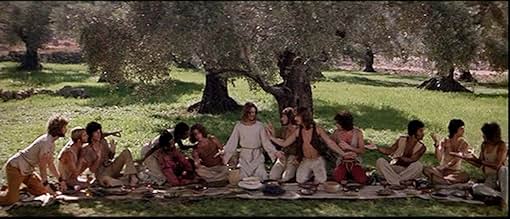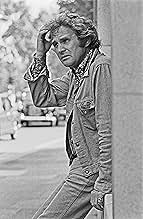IMDb-BEWERTUNG
7,4/10
30.507
IHRE BEWERTUNG
Verfilmung des Musicals über die letzten Wochen von Jesus Christus, die auf anachronistische Weise erzählt werden.Verfilmung des Musicals über die letzten Wochen von Jesus Christus, die auf anachronistische Weise erzählt werden.Verfilmung des Musicals über die letzten Wochen von Jesus Christus, die auf anachronistische Weise erzählt werden.
- Für 1 Oscar nominiert
- 3 Gewinne & 13 Nominierungen insgesamt
Larry Marshall
- Simon Zealotes
- (as Larry T. Marshall)
Josh Mostel
- King Herod
- (as Joshua Mostel)
Kurt Yahjian
- Annas
- (as Kurt Yaghjian)
Paul Thomas
- Peter
- (as Philip Toubus)
Jeff Hyslop
- Apostle
- (as Jeffrey Hyslop)
Handlung
WUSSTEST DU SCHON:
- WissenswertesNorman Jewison managed only two takes of "The Temple" before he ran out of unbroken props, due to Ted Neeley's unrestrained energy when Jesus smashes everything.
- PatzerDifferences from the source material are not to be counted as goofs. Historical inaccuracies, such as tanks and guns in the year 0033, are also not counted as goofs, especially when related to artistic decisions.
- VerbindungenFeatured in Große Regisseure: The Films of Norman Jewison (1999)
Ausgewählte Rezension
I've heard much criticism of this film over many years, and the most annoying criticism is that it didn't have the vitality of the stage productions back "in the day". There isn't much many of us can do about that, though I did see a road production of it about 7 or 8 years ago.
The most interesting thing about this film is that it was set in "modern" times, rather than in biblical times. Roman soldiers wearing shiny helmets, and carrying machine guns is a real attention grabber. The ruins used in the film added another fascinating aspect to the production. In short, the anachronistic approach in the visuals, the lyrics, and the music itself make this a genuinely unique, and clever film.
I thought all the acting, singing, and dancing was great, and still appears to be rather fresh and modern. The lyrics were the most memorable of any movie I've ever seen. There were many of us that could quickly memorize the entire opera from listening to the soundtrack (no videos back then), and have much fun "play acting" ourselves.
The use of Judas as a primary character was probably the single most important aspect of the film. One has to wonder how Judas became one of the inner circle of disciples if he was such an evil crud to begin with. In church he is simply mentioned as being a traitor. The film/musical asks us to think more on this individual, and speculate as to his true nature as a human being. The only other person I know of that attempted to do this was Taylor Caldwell in her novel "I Judas". The point that the crucifixion/resurrection hinged on the betrayal of Judas, should make any Christian wonder if God actually worked through him, and that he wasn't actually "damned for all time."
People seem to be offended by the light-hearted (and hysterically funny!) "King Herod's Song." What does the Bible say about this meeting? Certainly it doesn't say that this was an amicable meeting, and indeed, I seem to remember Jesus being beaten on the palace grounds. The look on Neely's face throughout the Herod song-and-dance is one of seriousness that belies the true nature of what was going on in this scene. This served to remind the viewer that this wasn't sheer levity, and held the scene together in its proper context until it ran full circle with Herod "spazzing" and showing rabid, rather than merely sarcastic hatred for Christ at the end. This was sheer genius and master film craft in my book. I don't think Jesus' expression would come out as well in the stage version. The reservations Pilate had about authorizing the crucifixion seem to come out in the Bible as well. So-called Christians hold Pilate responsible, though there was probably many political things going on that are only vaguely alluded to in the Bible. Non-biblical tradition says that he and his wife, Claudia Procula, eventually converted to Christianity themselves. Who knows?
My least-favorite parts: "I Don't Know How to Love Him" reminds me a lot of "As Long as He Needs Me" in Oliver!. Both songs are plodding, and brings each film to a screeching halt. I believe that this was actually intended to be a pop song, but was thrown in when Webber and Rice were composing the opera. Still, Judas singing this through his tears towards the end of the film was very chilling. "Hosanna, Hosanna" I also find to be rather trite...still...the last stanza never fails to give me goose bumps when the crowd asks if Christ will die for them. Simon Zealot's prolonged screaming (and off key/beat) never fails to annoy me...then again, he was a rebellious zealot after all. The "falling down push up" move in this dance sequence bugs me, too. Another part that bothers me is that suddenly it was Pilate's dream, rather than his wife's as stated in the bible. I guess they did this to narrow the canvas (simplify the number of key characters). But, what a beautiful song! And, I thought the fact that nobody in the cast looked to be much over 25 was kind of weird.
My favorite parts: Caiphas' baritone and Annas' falsetto counterpoint. "Too Much Heaven on Their Minds." The guy with the froggy voice heckling Christ as he's shuffled between Herod and Pilate. The gorgeous girl in the purple shirt (dancer in the Zealot scene)...WHO IS SHE????? Any scene with Judas in it. The montage of crucifixion scenes. The great guitar (all the instrumentation for that matter), and something I wish they had MUCH more of in the movie, that incredible electric piano. I would buy just the instrumental track if it was available.
The most interesting thing about this film is that it was set in "modern" times, rather than in biblical times. Roman soldiers wearing shiny helmets, and carrying machine guns is a real attention grabber. The ruins used in the film added another fascinating aspect to the production. In short, the anachronistic approach in the visuals, the lyrics, and the music itself make this a genuinely unique, and clever film.
I thought all the acting, singing, and dancing was great, and still appears to be rather fresh and modern. The lyrics were the most memorable of any movie I've ever seen. There were many of us that could quickly memorize the entire opera from listening to the soundtrack (no videos back then), and have much fun "play acting" ourselves.
The use of Judas as a primary character was probably the single most important aspect of the film. One has to wonder how Judas became one of the inner circle of disciples if he was such an evil crud to begin with. In church he is simply mentioned as being a traitor. The film/musical asks us to think more on this individual, and speculate as to his true nature as a human being. The only other person I know of that attempted to do this was Taylor Caldwell in her novel "I Judas". The point that the crucifixion/resurrection hinged on the betrayal of Judas, should make any Christian wonder if God actually worked through him, and that he wasn't actually "damned for all time."
People seem to be offended by the light-hearted (and hysterically funny!) "King Herod's Song." What does the Bible say about this meeting? Certainly it doesn't say that this was an amicable meeting, and indeed, I seem to remember Jesus being beaten on the palace grounds. The look on Neely's face throughout the Herod song-and-dance is one of seriousness that belies the true nature of what was going on in this scene. This served to remind the viewer that this wasn't sheer levity, and held the scene together in its proper context until it ran full circle with Herod "spazzing" and showing rabid, rather than merely sarcastic hatred for Christ at the end. This was sheer genius and master film craft in my book. I don't think Jesus' expression would come out as well in the stage version. The reservations Pilate had about authorizing the crucifixion seem to come out in the Bible as well. So-called Christians hold Pilate responsible, though there was probably many political things going on that are only vaguely alluded to in the Bible. Non-biblical tradition says that he and his wife, Claudia Procula, eventually converted to Christianity themselves. Who knows?
My least-favorite parts: "I Don't Know How to Love Him" reminds me a lot of "As Long as He Needs Me" in Oliver!. Both songs are plodding, and brings each film to a screeching halt. I believe that this was actually intended to be a pop song, but was thrown in when Webber and Rice were composing the opera. Still, Judas singing this through his tears towards the end of the film was very chilling. "Hosanna, Hosanna" I also find to be rather trite...still...the last stanza never fails to give me goose bumps when the crowd asks if Christ will die for them. Simon Zealot's prolonged screaming (and off key/beat) never fails to annoy me...then again, he was a rebellious zealot after all. The "falling down push up" move in this dance sequence bugs me, too. Another part that bothers me is that suddenly it was Pilate's dream, rather than his wife's as stated in the bible. I guess they did this to narrow the canvas (simplify the number of key characters). But, what a beautiful song! And, I thought the fact that nobody in the cast looked to be much over 25 was kind of weird.
My favorite parts: Caiphas' baritone and Annas' falsetto counterpoint. "Too Much Heaven on Their Minds." The guy with the froggy voice heckling Christ as he's shuffled between Herod and Pilate. The gorgeous girl in the purple shirt (dancer in the Zealot scene)...WHO IS SHE????? Any scene with Judas in it. The montage of crucifixion scenes. The great guitar (all the instrumentation for that matter), and something I wish they had MUCH more of in the movie, that incredible electric piano. I would buy just the instrumental track if it was available.
Top-Auswahl
Melde dich zum Bewerten an und greife auf die Watchlist für personalisierte Empfehlungen zu.
Details
- Erscheinungsdatum
- Herkunftsland
- Sprache
- Auch bekannt als
- Iso Masih - super yulduz
- Drehorte
- Dead Sea, Israel(King Herod's Song)
- Produktionsfirma
- Weitere beteiligte Unternehmen bei IMDbPro anzeigen
Box Office
- Weltweiter Bruttoertrag
- 115.531 $
- Laufzeit1 Stunde 46 Minuten
- Farbe
- Seitenverhältnis
- 2.35 : 1
Zu dieser Seite beitragen
Bearbeitung vorschlagen oder fehlenden Inhalt hinzufügen

Oberste Lücke
By what name was Jesus Christ Superstar (1973) officially released in India in English?
Antwort




























